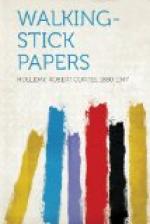“No, sir,” he rumbled, “you cannot find to-day a cigar-smoking animal” (though the Colonel is so erudite a man, his language is terrible) “who could be lured into the pages of our women novelists without snorts—snorts, sir—of disgust, or bellows of derisive mirth. Why? Because these pages no longer contain an acute transcript of life as only a sensitive feminine mind would have the cunning to observe it, and of a form of human life in itself highly feminine in its character, but they now present a singularly insular travesty of man, an unconscious caricature of man as he could only appear to a feminine mind bound by the romantic limitations of sex, a mind, that is, devoid of masculine understanding, unable to recognise by virtue of affiliation of instinct that which is fine in the male character and that which is false to type.
“Sir,” continued the Colonel, “these pictures are coloured, on one hand, by ludicrous prejudice against masculine qualities which the feminine nature temperamentally feels to be antagonistic, or dangerous, to itself; and, on the other hand, by sentimental worship of masculine attributes conceived to be desirable complements to the frailty of women. This amusing view of man springs not only from the element of sex, as I have said, but from the very marrow of sex. We do not get from the contemporary authoress creative literature at all; that is, a disinterested criticism of mankind; we get in each picture of a male character her instinctive, and intensely interested, feeling as to whether or not he is a man whom it would be desirable, and safe, for a young woman to marry. Paradoxically enough, it would seem that women have less and less knowledge of the world as they have contrived to see more of it; that as they have become more emancipated in liberty of action they have become more clannish in thought; and that as the range of their opportunities has widened and their interests have multiplied, their concern with the most elemental female instinct, their preoccupation with their immemorial business of the chase, has but intensified. By word of mouth the modern woman tells us that in her practical and intellectual capacities she has advanced far beyond her sisters of an earlier day; we chance to look into that pool of fiction wherein she mirrors her heart, and we find her the same self-centred huntress as of yore.
“Sir,” cried the Colonel, jolting some tobacco ash off the ledge made by his abdomen, which he did by pounding the side of his torso with a bulky volume of the “Autobiography of Benvenuto Cellini,” “what is the theme of the most conspicuous portion of our fiction by feminine hands? In large measure it is a peevish criticism of husbands. We have the popular creator of a type of husband held up to the scorn and ridicule of the sorority of her readers, remarking by way of commentary on her satirical pictures that there should be ‘a school for husbands.’ It is, apparently, this lady’s complacent belief




